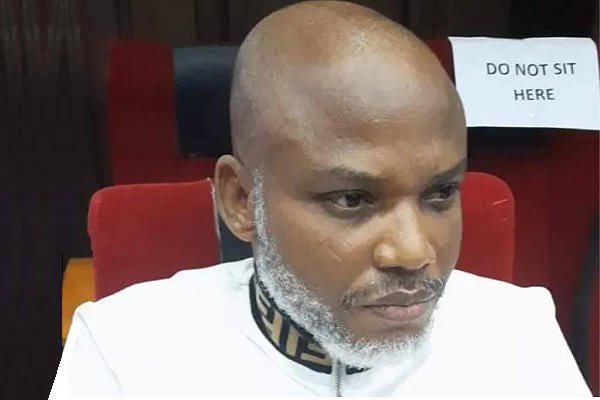The court has delivered judgment on Nnamdi Kanu’s N1bn suit against the Nigerian government.
NewsOnline Nigeria reports that the High Court, Abuja, on Monday, July 1, dismissed a N1 billion suit filed by Nnamdi Kanu, the detained leader of the Indigenous People of Biafra (IPOB), against the Federal Government.
The judge, James Omotosho, in a ruling, declared that Kanu failed to provide reasonable evidence to back the alleged violation of his fundamental rights by the defendants.
Omotosho ruled that there was inadequate evidence to support the allegation that Kanu’s lawyers were intercepted by the State Security Service (SSS).
ALSO: Nigerian Army Slammed With Two Billion Naira Rights Suit
Kanu filed lawsuits against the Federal Republic of Nigeria (FRN), the Attorney-General of the Federation (AGF), the SSS, and its director-general.
In the originating summon marked: FHC/ABJ/CS/1633/2023, Kanu prayed for eight reliefs including “a declaration that the respondents’ act of forcible seizure and photocopying of confidential legal documents pertaining to facilitating the preparation of his defence, which were brought to him at the respondents’ detention facility by his lawyers, amounted to a denial of his rights to be defended by legal practitioners of his own choice.”
Kanu asked for a ruling that it was illegal for the respondents to have prevented his lawyers from making notes during their professional talks and consultations with him while he was being held by the DSS.
In addition, he requested a declaration that the respondents’ act of listening in on his private discussions and consultations with his attorneys constituted a denial of his rights, among others.
A staff member of the SSS, Yamuje Benye, testified that eleven paragraphs of Kanu’s affidavit were false in the application.
He said that Kanu was not being held in solitary confinement and that the SSS had him in safe and secure care.
Benye claimed that as it is the best practice globally, Justice Binta Nyako, who is overseeing Kanu’s criminal trial, has consistently maintained that visits to him should always be supervised.
According to him, to guarantee the utmost comfort for Kanu and his visitor(s), the applicant and his visitors were allowed to confer and engage during visiting days in one of the secret police’s best interview spaces.
In her ruling, the judge, Omotosho, determined that Kanu had not produced sufficient proof to support his allegations of interference with his legal representation, unrestricted access to his attorneys, and SSS officials listening in on his talks with them.
Omotosho held that the claims that Kanu was denied unhindered access to his lawyers by the operatives of the SSS and that the officials eavesdropped on his discussions with his lawyers in the preparation for his defence, could not be documented.















